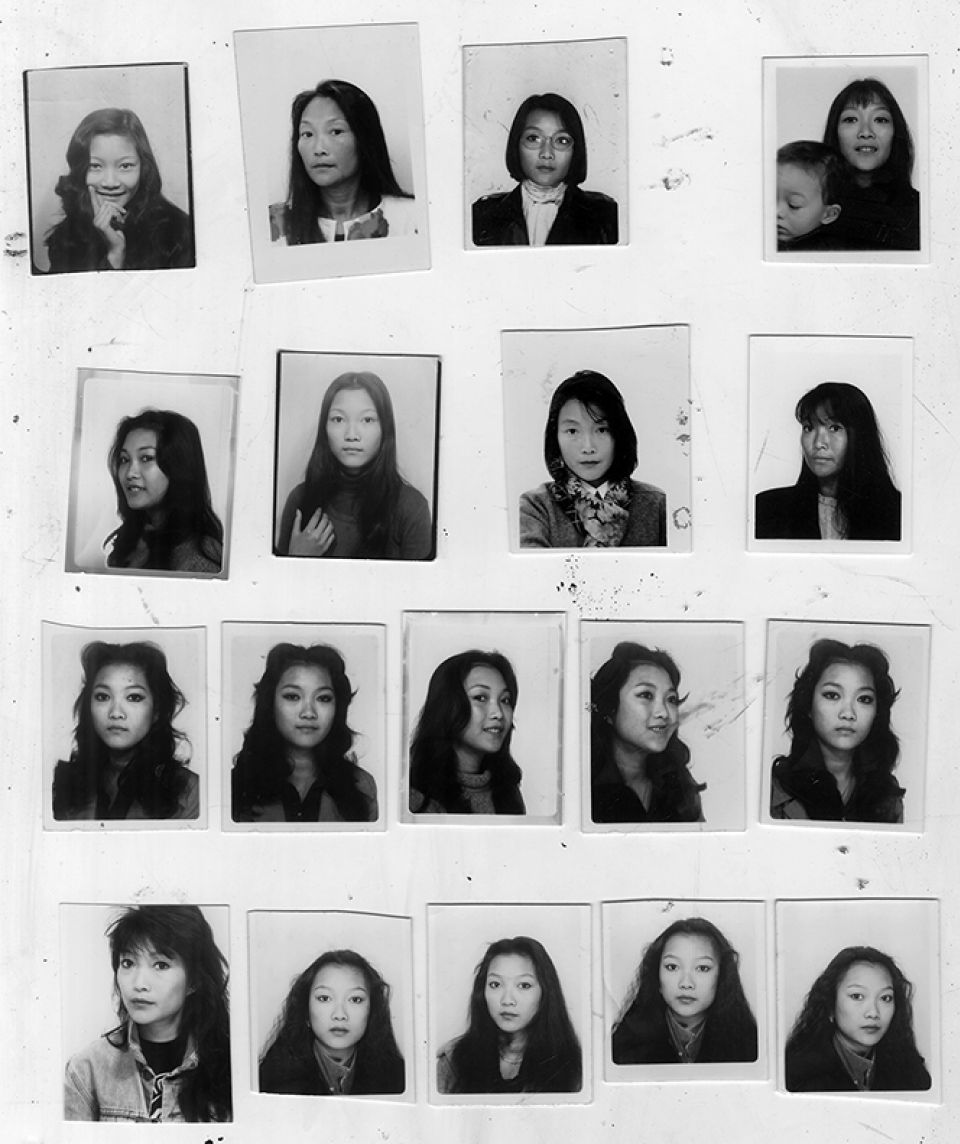№1 Gaze at the Other, Gaze of the Other
Killer Apps and No Emails: A Few Comments About the Chinese Internet
08.11.2020,
In the People’s Republic of China a sizable internal market has nurtured a whole set of context-specific online and mobile applications and platforms, whose names—other than TikTok—are mostly foreign to the West. To provide a wider perspective, we invited French game designer Corentin Raux, China-born Australia-based software engineer Jinzhe Li 李琎喆, and Ying Xiang's editor Yueshu Jian 见悦书 to compare key aspects with a focus on WeChat—China’s indispensable app.

Illustration by Jinhwa Jang 장진화
Corentin Raux (CR), Jinzhe Li (JL), Yueshu Jian (YJ)
CR
What are the most popular online video services in China?
JL
TikTok. Even my parents have it on their phones. You can't really use YouTube in China, so there are equivalent services. But then in China everything is categorized—you go to different platforms depending on which type of content you're looking for, like Bilibili for cartoons, manga, and video games, or iQIYI for TV series and films.
CR
What sort of devices do people use for browsing?
JL
That's a little bit different compared to the Western world, where the website plays a big role. In China the website itself is really not a priority. Most people hardly use a computer’s browser—the browser is used on the phone. Chinese people probably use mobiles way more than any other device.
CR
If you're looking for something online, where would you go?
JL
In the West you always start your search with Google, to redirect you to a proper website. In China there's also a search engine, called Baidu, but not everyone uses it because the search engine is not as powerful, I would say, as Google. Baidu doesn’t really rank according to the quality of the content, and then sometimes it shows you results based on advertising, so personally I don't like it. It really depends on what you want to search for. For example, say my mother wants to search for something about fitness or beauty, there's an app called Little Red Book, visual and very similar to Instagram, where my mom can follow fitness or beauty influencers and look at their posts. But if my dad wants some information about the US elections, he goes to another app called Zhihu, which means "know?" and is much more text-based. Zhihu’s an app where people can ask questions and the community gives answers—there's a similar service in the West called Quora. It really comes down to what you're searching for.
CR
So when you're looking for content, the first step is to ask yourself what kind of app to use to find the content you’re after. But what if, for instance, I'm interested in a specific Chinese brand, and I would like to visit their website? Are you telling me there is no website?
JL
I’d say most of the big brands still have very simple websites, which generally no local Chinese citizen would visit. Brands rely on social media and apps to host official information; apps like Weibo, TikTok, and especially WeChat, which has official accounts for businesses. If you’re doing business in China you probably don't have a website, but you have to have a WeChat account, because otherwise people won't find you.
On WeChat you can add a business’ official account, follow all their news there, and get in contact with their support staff directly. Then, when they have promotions, they can send notifications back to you. A WeChat account provides all the news and content that an official website would.
If you’re doing business in China you probably don't have a website, but you have to have a WeChat account, because otherwise people won't find you.
—Jinzhe Li 李琎喆
CR
So rather than a standalone website, as in the West, businesses will use a sort of embedded website within WeChat?
JL
Yeah, that's pretty much it. In China they really hate putting English words in a browser and then going to your website. Everyone knows how to use a QR code, and these get scanned to open pages in WeChat. In WeChat, there's a very popular thing for brands called Mini Apps—an app inside WeChat. Lots of businesses have Mini Apps and don't even have websites. Previously, businesses wouldn't necessarily want to build apps for their products because it takes a lot of work and expertise to design apps for iOS and Android. A WeChat official account with Mini Apps doesn't need knowledge of computer language. The approval review process for Mini Apps is also much easier than with native apps on iOS or Android, and the push notifications from Mini Apps in WeChat are far more efficient for brands than email campaigns.
CR
Are there any other big applications in China where my presence, as a brand, would be important, if I want to make sure that people can find me? Or is WeChat the most important entry point?
YJ
WeChat is definitely the one with the credentials and authority. Western luxury brands are very careful and sensitive about their images on social media, but they are all present on WeChat because it is considered official, it’s where you’re expected to communicate the latest information on your brand. Of course, all of them are also present on Weibo, which is sort of a Facebook/Twitter equivalent. Weibo has lost its “exclusivity”, but everything and everyone is still on it. Posts on Weibo are much less selective or curated—it's just whoever wants to post whatever. The newcomer in the fashion and beauty business is probably Little Red Book, a very similar app to Instagram, which has achieved rapid success thanks to the rise of fame-seeking influencer culture in China. Another influential one is TikTok. For a long time, in China as in the West, social media was considered too “cheap” for luxury fashion, especially TikTok. Now it seems brands have just accepted it as an important marketing tool, targeting not only the young generation in China.
Western luxury brands are very careful and sensitive about their images on social media, but they are all present on WeChat because it is considered official, it’s where you’re expected to communicate the latest information on your brand.
—Yueshu Jian 见悦书
JL
But no one can really compete with WeChat. If your target audience is the Chinese market, then all of a sudden you have a potential client base of over one billion people thanks to WeChat. Everyone is already there, all ranges of audience.
CR
What is WeChat in general? How did it start as a service, and what is it right now?
JL
It's hard to define what WeChat is because it's a bit of everything! Like, everything you use. But it goes back to 2011, when it didn't have an English name yet. In Chinese it was called (and is still called) Weixin. It started off as an incubator program for the tech company Tencent, who had a messaging software called QQ that everyone was using. QQ was purely a computer desktop software messaging app. It was more text-based, which was then popular.
Tencent needed to find a new way to stand out. If everyone is talking by text, then everyone can just install and use QQ, so why build a new app? The new thing was to find a better user experience for how to send messages, to find new ways to make communication easier. And so Weixin (WeChat) was started as a messenger service. They developed walkie-talkie-style recorded messages—you press the button and record what you say, then that recording gets sent to the other party. It's always a pain just to type. If you want to talk, it's much easier. What young people really enjoy in WeChat is that not only do you have cute emojis and can send stickers—and could from very early on—you can also send GIFs. People love it because it is so animated and people can express themselves not only with words. It's much more fun than just a regular messenger app. So people started to gradually move from QQ to WeChat—even though they are from the same company—and over the years WeChat gained a bigger and bigger audience. If you look at WeChat now, it's no longer just a messaging app.
YJ
Another interesting thing about the way the Chinese communicate with each other is that they make phone calls but they hardly email, similar to how they don't like to use websites. I honestly don't know anyone who uses email for personal reasons—they’ll call you up or send you a WeChat message instead. And for companies, email is only used if they’re international or have international collaborators. Or if they’re more local companies, only for very formal things like sending reports, CVs, contracts, etc. Very rarely do small-scale local company employees send each other emails to talk about work. They all have company WeChat groups. Gradually China banned foreign messenger services like WhatsApp and Google Chat, so most foreigners download WeChat to communicate with Chinese collaborators or colleagues.
CR
Can you tell us a little more about Tencent, WeChat’s parent company? Tencent is huge in China. You even see some big Hollywood movies now with Tencent as an investor. What does it do exactly?
JL
It's a technology company. In the Western world, especially in the US, you've got Facebook, Twitter, LinkedIn, Amazon, Google, etc. But in China you've got Baidu (that search engine I mentioned earlier, not as popular as Google), you’ve got Alibaba (the equivalent of Amazon), and then also Tencent. Tencent started with the QQ messaging app, which is still almost as popular as WeChat. But Tencent is also making moves into video production and making games; it has its fingers in all the industries.
YJ
Tencent is involved in so many things beyond WeChat: cinema, gaming, finance, social media, and it has so many users who put their money into it. Tencent doesn't operate like Facebook—which bought Instagram, and WhatsApp, and then kept these apps in more or less the same business model.
CR
How did WeChat expand from this messaging application to being something so global? There are so many things that you can do in WeChat now. Can you tell us about those different WeChat uses?
JL
WeChat started by providing new, easier ways to communicate, and first gained a young audience, who gradually taught their parents. WeChat became a success because people find it so easy to use. My parents don't even have QQ on their phones, but now they use WeChat everywhere. It's step by step, and then all of a sudden WeChat’s audience gets so big you assume everyone is on it. And because there are so many people in the Chinese market, it's WeChat you have to use to market your business.
Once WeChat gained everybody’s loyalty to it, because it's an incredible messenger and social media app, it continued to expand with different functionalities. For instance, they entered the financial/banking market. This started with digital money in your WeChat wallet, which you could directly transfer to someone, and today you can pay for anything via your WeChat. You can even go to a flea market, scan a merchant’s QR code and pay them—and I believe you can even do this in rural areas.
WeChat started by providing new, easier ways to communicate , and first gained a young audience, who gradually taught their parents. WeChat became a success because people find it so easy to use.
—Jinzhe Li 李琎喆
CR
This is crazy cool. So, I don’t even need to have cash as a merchant or a wallet if I’m a customer, just my phone and WeChat?
JL
Yeah, even crazier when you imagine that these rural areas are so far away from technology in other aspects—they have old TVs but they use WeChat and know how to scan QR codes and make payments through the app. I remember when it started my mother asked me whether it was legit, she just didn't feel comfortable converting real money into digital money. At that time not all merchants accepted WeChat, but now it's everywhere, so it's not a problem. You can use WeChat Pay to buy a ticket on the bus. Once people became used to its payment methods, WeChat started to act like a bank—like you can even buy financial products and make investments through it. You could call WeChat a digital bank.
CR
Does this reflect the relationship between people and money in China? In the West, for instance, when it’s Christmas we often buy things for people that they don’t care about, socks for a friend or a coffee mug. In China, as far as I know, it’s more common to offer money to people. And WeChat offers this functionality. Do you think there is something cultural that made the efficiency of WeChat Pay so appealing, and grow so suddenly, in China?
JL
The function you mention is called Red Pocket in WeChat. In China, in real life, a red pocket is a red paper envelope that older generations put money in to give to younger generations during Chinese New Year, instead of sending gifts. It is a very traditional thing. And yes, I think culturally the Chinese think money is more efficient than gifts. WeChat might have taken advantage of that. Sending money is a grateful and friendly gesture in China. So of course, during New Year WeChat can gain even more popularity among people who want to send red pockets, greetings, animated cards, etc.
CR
So in a nutshell, I can use WeChat as a messenger application, browse content for brands and to interact with them through Mini Apps, pay you for physical goods, send money to my friends and relatives, and as a social media platform. Could you tell me more about the social media part?
JL
This part in WeChat is called “Moments”. It's a newsfeed, equivalent to Facebook or Twitter.
CR
In “Moments” you can post photos and words. It's one of the important reasons that people stick to WeChat, because of this very popular social function. In China there is another very popular social media platform quite close to Facebook or Twitter, Weibo. One of the big differences between WeChat and Weibo is that on Weibo everyone and anyone can follow you and see your feeds—more like a Facebook fan page if you had a company account, or were a celebrity or blogger. On WeChat, only people you have accepted to be your friends can see your feed or posts. So, WeChat is very personal as a social network, much more personal than Weibo.
JL
Something that is very important, especially on Instagram, in the Western world, is the part played by what we call the influencers—people with a lot of followers, who can become highly profitable through social media, acting as a business. Are there influencers on WeChat, or somewhere else?
CR
WeChat Moments is not really a place for influencers because it’s a feed for people you know in real life. Some influencers are on TikTok, Little Red Book, and other new, less famous, apps, like Kuaishou.
YJ
TikTok has a broad range of influencers. In the creative industry, especially for fashion and beauty, Little Red Book is quite important now. It's very much for the —younger generation, and heavily inspired by Instagram. There you can see the phenomenon in China of the many girls who want to become influencers, with insanely over-retouched photos—basically, they want very small, pointed faces with huge eyes, and disproportionately long legs. At the end of the day, with this heavy-handed photo retouching and thick filters, everyone looks kind of the same.
On Little Red Book you can see the phenomenon in China of the many girls who want to become influencers, with insanely over-retouched photos—basically, they want very small, pointed faces with huge eyes, and disproportionately long legs. There you can see the phenomenon in China of the many girls who want to become influencers, with insanely over-retouched photos—basically, they want very small, pointed faces with huge eyes, and disproportionately long legs.
—Jinzhe Li 李琎喆
CR
How big is WeChat in China? Does it have competitors?
JL
As a messaging/payment/marketing platform, I don't really know of any competitors in China. In 2020, it had 1.2 billion active users. If considering it only as a payment app, then you also have Alipay, from the group Alibaba.
YJ
Even in Paris, especially the department stores or some luxury brands, they have this QR code at their counters to allow the Chinese customers to pay through WeChat or Alipay. In Italy, in some smaller shops you can also pay with these apps. All this started only a few years ago.
CR
In the Western world Facebook is big in terms of advertising, with a lot of ads in your newsfeed. It's the same on Instagram, where brands leverage influencers to advertise their brands. How can we compare this to the advertising in China on TikTok, Weibo, WeChat, etc.?
JL
I think it comes down to the stage of advertising. Before sale, it's normally probably more on TikTok. If you are a beauty influencer there, you probably already have a couple of thousand followers who know you do make-up reviews. It's the same logic as product placement.
CR
Are there ads in WeChat?
JL
There are, but they’re rare, very rare. It’s a problem on Facebook, you see ads all the time. But not in WeChat.
YJ
I hardly see any ads in WeChat. Maybe because I live outside China. I don’t think WeChat really counts on that to make money, and they're so right not to annoy their users with this. I really enjoy this aspect.
JL
You don't see ads? It really depends then. At the moment I see one ad all the time about how to teach your kids Chinese! Somehow they know I’ve got a kid, but I don't know how they found out!
CR
Facebook makes a lot of money from advertising; it’s their main business. What is the business model for WeChat? Do brands pay to be on WeChat? Do you pay to create a Mini App?
JL
WeChat only charges a small management fee for Mini Apps, like two to three hundred dollars a year. I don't think WeChat really needs to count on these small fees or ads to make it a profitable company. Tencent never really communicates WeChat’s revenues, but gaming is probably a big income stream for them. Also, WeChat has so many users, and they all transfer their money into the app and use its payment services, so its banking part should be enormous.
YJ
Tencent creates indispensable functions in their products, and makes users so loyal and inseparable to them. Then the company keeps on investing in all its other profitable businesses. They want to be something else that has not existed. You see this with another giant in China, Alibaba. We think they are just a Chinese Amazon, but they are much more — they provide different channels for merchants to sell their products, different ranges of brands. Now even the luxury brands are installed on their platform. They put on huge concerts to help their “Single Day” sales event — last year they invited Taylor Swift — they want to be a fun platform too. New apps and platforms come all the time, just like in fashion. The brands stick to WeChat and Alibaba for their marketing and communication. The once influential Weibo started to lose its appeal to audiences and brands because it’s not as good at innovating. But there are always new apps and platforms available in this very competitive and fast-evolving market.
This conversation took place on 8 November 2020.
CORENTIN RAUX
is a French game designer and co-founder of mobile game company Pretty Simple.
JINZHE LI 李琎喆
is a China-Born Australian software engineer, he is also the webmaster of
Ying Xiang.
YUESHU JIAN 见悦书
is the founding director of Ying Xiang. She has been working in the fashion industry for over a decade between China and France, and currently lives and works in Paris.
JINHWA JANG 장진화
is an illustrator who works and lives in Seoul. Born in Seoul, she lived in Shanghai during her childhood and studied illustration in New York City. Her works are influenced by Japanese comics and risograph aesthetics, inspired by her urban lives and people in the city.
related content

A Letter from a Voyager
—
A letter from the editor describing her journey to Ying Xiang.

Introducing and Curating Fashion in China
—
Pooky Lee shares his approach to communicating fashion in today’s China, shedding light on the actual status of an industry heavily dependent on celebrity culture, and his own predilection for a conversation beyond commerce.

Re-examining Shanghai Calendar Girls
—
Calendar posters in China’s Republican era transformed the visual sphere of modern experience through an evolution in the representation of the female figure.












